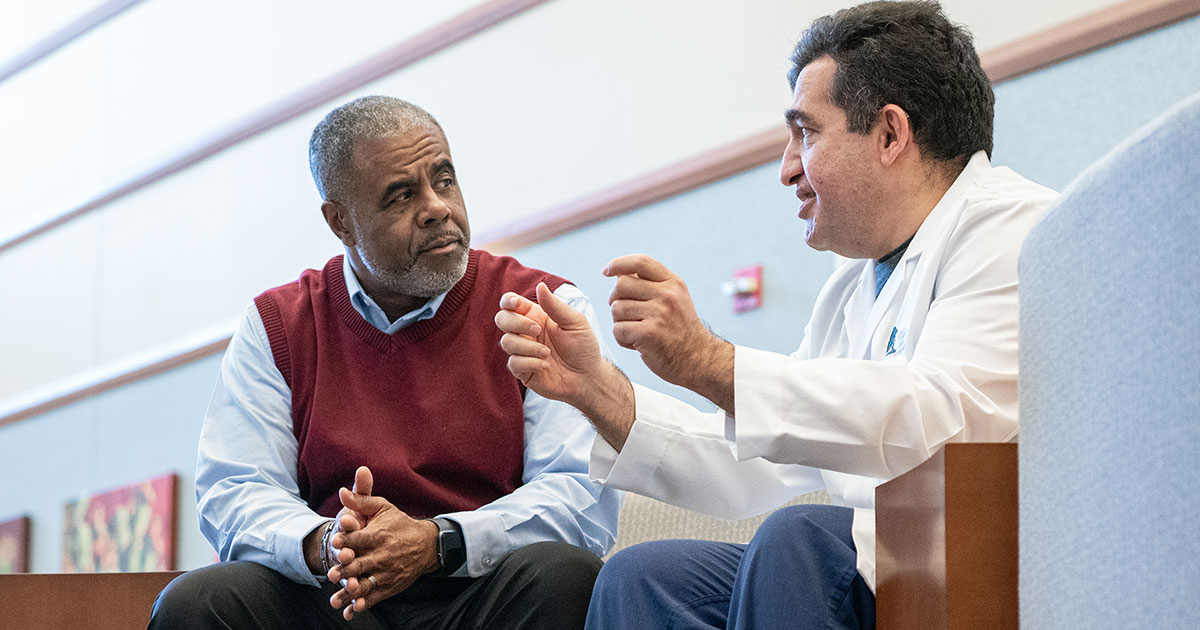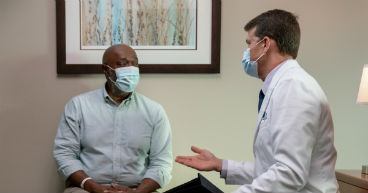
Each year, close to 300,000 men in the United States learn they have prostate cancer. Next to skin cancer, it’s the most common cancer affecting men in this country. Caught early, prostate cancer is very treatable, but it also may have a profound impact on a man’s quality of life.
Until a decade or so ago, most men diagnosed with prostate cancer were immediately treated with surgery or radiation therapy—no matter how low their risk of the disease progressing or becoming life threatening. Yet while the treatments are effective, they can also cause serious side effects, such as sexual dysfunction and urinary problems.
Today, medical experts urge many men with low-risk prostate cancer to take a wait-and-see approach to treatment, called active surveillance, so they don’t risk the side effects unnecessarily.
So, why do the side effects of prostate cancer and its treatments have the potential to be so detrimental to a man’s quality of life? The main reason is prostate’s location next to several vital parts of the body, including the bladder and rectum. Treatments like surgery and radiation therapy may disrupt normal urinary, bowel and sexual functioning.
Other common treatments, like androgen deprivation therapy (ADT)—a hormone therapy—focus on reducing the amount of testosterone in a man’s body. That’s because prostate cancer may feed off testosterone, and reducing the amount of testosterone can kill off cancer cells or, at least, make them grow more slowly. But low levels of testosterone can cause other problems, such as depression, erectile dysfunction and fatigue.
Because prostate cancer treatments may have such a major impact on quality of life, supportive therapy is especially important.
In this article, we’ll explore:
- What side effects does prostate cancer treatment cause?
- What is prostate cancer supportive therapy?
- What are the benefits of prostate cancer supportive therapy?
If you’ve been diagnosed with cancer and are interested in a second opinion on your diagnosis and treatment plan, call us or chat online with a member of our team.
What side effects does prostate cancer treatment cause?
Prostate cancer treatments often impact a patient’s sex life. Surgery, radiation therapy and hormone therapy may cause side effects like low sex drive, loss of penis length, dry orgasm, low sperm count and/or erectile dysfunction.
But treatments don’t just have the potential to affect sexual functioning, they may impact urinary and bowel function, energy levels and muscle mass, too.
Common side effects of prostate cancer treatment that aren’t related to sexual function include:
Urinary dysfunction
Problems with urination range from leaking urine to a complete loss of bladder control. They may also include difficulty emptying the bladder, pain while urinating and an increased urgency to go.
Initially, urinary symptoms are typically caused by an enlarged prostate that obstructs the bladder. But once treatment begins, they tend to be due to treatment. When the prostate is surgically removed, for example, during a prostatectomy, the bladder is commonly pulled down and connected to the urethra. If the base of the bladder is damaged during surgery, it can lead to urinary leakage and other problems.
Radiation therapy to the prostate may irritate the tissues of the nearby bladder and urethra, causing an increased urgency to go, a feeling of needing to urinate more often than usual and waking up at night to use the bathroom, which is called nocturia.
Bowel dysfunction
In rare cases, the rectum may be damaged during a prostatectomy, causing bowel problems like rectal bleeding.
Radiation therapy also may cause the lining of the bowel to become inflamed, leading to problems like loose and watery bowel movements, an increased urgency to go, a feeling that the bowels haven’t emptied completely and pain in the abdomen.
Low testosterone levels
ADT is standard of care for many men with advanced prostate cancer. But lowering testosterone levels also may cause side effects, including hot flashes, bone density loss, an increased risk of diabetes and heart attacks, mood swings and weight gain.
Fatigue and neuropathy
Fatigue is a common side effect of prostate cancer treatment, especially radiation therapy, hormone therapy and chemotherapy. In fact, about half of all men who take docetaxel, a common chemotherapy drug for prostate cancer, experience fatigue at some point during their treatment.
About one-third experience neuropathy, or numbness or weakness, in their toes or fingers.
Nausea and vomiting
Certain prostate cancer treatments, including some types of radiation therapy and chemotherapy, may cause nausea and vomiting.
Depression
While depression may affect anyone who receives a cancer diagnosis or undergoes treatment, men with prostate cancer who are treated with ADT are especially susceptible. According to one study, patients who receive ADT have a 41 percent higher risk of depression than those who don’t.
Bone pain
If prostate cancer spreads, it may cause bone pain. Hormone therapies like ADT that lower testosterone levels in the body and cause men to lose bone density may also lead to pain in the bones.
What is prostate cancer supportive therapy?
According to the National Cancer Institute, the goal of supportive care is to improve the quality of life of people who have an illness or disease by preventing or treating, as early as possible, the symptoms of the disease and the side effects caused by treatment of the disease.
Supportive care may include physical, psychological, social and spiritual support for patients and their families. Some examples include pain management, nutritional support, counseling and exercise. Typically, supportive therapies are recommended alongside traditional therapies to help manage any side effects that arise.
Here are some common side effects of prostate cancer treatment that aren’t related to sexual function and ways that supportive therapies may help:
Urinary dysfunction: Most men are treated with alpha-blocker medicines—like tamsulosin (Flomax®) or terazosin (Hytrin ®)—for a few weeks following radiation therapy to relax the prostate muscles. Pelvic floor muscle strengthening exercises may also help.
If urinary symptoms won’t go away, though, a doctor may recommend an injection of collagen into the urethra, which tightens the fibromuscular tube, making it harder for urine to leak through. A surgical procedure, such as a sling placed under the urethra, may also be performed to relieve pressure.
Bowel dysfunction: Digestive treatment options may help relieve bowel problems during prostate cancer treatment. They may include certain medicines, diet changes and pelvic floor exercises.
Low testosterone levels: Reactions to the low testosterone levels caused by ADT vary. But changes in diet and exercise may help reduce side effects. For instance, incorporating physical activity into daily routines and eating a diet that’s low in red meat and high in vegetables and fiber may help counteract the risk of diabetes, heart disease and weight gain.
A patient’s doctor also may recommend certain medicines to reduce hot flashes and the risk of fracture from the loss of bone density.
Fatigue and neuropathy: Although most fatigue and neuropathy symptoms go away on their own, if they persist, it’s important for patients to talk to their doctor to see if their chemotherapy regimen can be adjusted. For example, reducing the dose or delaying the next dose may help prevent neuropathy from getting worse. Exercises like yoga or taking daily naps have also been found to reduce fatigue for some patients.
Nausea and vomiting: Nausea and vomiting from prostate cancer treatment may be treated with anti-nausea medicines, like steroids. Eating bland foods, like crackers and toast, and staying hydrated may also help ease these side effects.
Depression: Patients should talk to their doctor if you think they may be depressed. It may be managed with counseling and medication. Spiritual support may also be an option for patients of faith.
Bone pain: Treatments for bone pain may include pain medicine and corticosteroids. Patients should talk with their doctor about symptoms they’re experiencing to prevent them from getting worse.
What are the benefits of prostate cancer supportive therapy?
Receiving a prostate cancer diagnosis doesn’t have to mean a lower quality of life. Patients should talk to their doctor about what they’re experiencing so they can manage symptoms and treatment side effects early. This helps patients live longer, better lives.
If you’ve been diagnosed with cancer and are interested in a second opinion on your diagnosis and treatment plan, call us or chat online with a member of our team.




